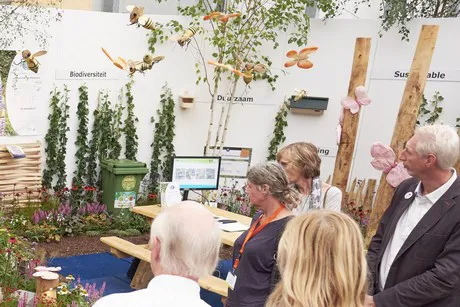As soon as visitors enter Plantarium and GROEN-Direkt, they are shown a pilot of compact living/recreation in combination with experiencing nature. Because 'small' is the buzzword for urban renewal and rural development, 'Tiny Houses' and 'Tiny Forests' are becoming more and more popular. A 'Tiny House' situated amid a natural oasis of water and greenery is on exhibition in the entrance hall. It is a great example of the theme 'Green Fits All'.

Ecological route
The entrance hall is also the starting point for the Ecological route. This route takes visitors past participants presenting products and/or services in the area of sustainability. Visitors can walk the route independently with the help of a map, or they can join a guided tour at fixed times in various languages.
Entire ornamental horticulture chain
The companies that are included in the Ecological route are very diverse and come from all the links in the ornamental horticulture chain. From breeders/propagators, growers, packaging to certifiers and advisers who support companies in their process towards sustainability.
The route takes visitors past the following companies:
- ALLURE Tuinplanten grows sustainable ornamental grasses. An ecological footprint has been calculated for each plant and the CO2 emission is (partly) compensated.
- Colour your Garden has developed a new zero-plastic tray that can reduce the amount of plastic used.
- Decock Plants is specialised in the production of young plants that are grown sustainably.
- Designstar presents PLM BIO for packaging, labels, etc. This paper is water-resistant and can be processed in the regular waste paper flows without any difficulty.
- FlorAmor works with respect for people, nature and the environment. The company has the necessary sustainability certificates, MPA-A, GAP and SQ, product proof.
- Hoogeveen Plants presents Tasty Green, a new organic fruit concept.
Lily Company exhibits organically grown, PlanetProof bulbs. - Rijnbeek Perennials supports landscaping projects all over the world in which the focus is on 'back to nature'. They use recycled materials (trays, boxes, etc.).
- MPS is convinced that the horticulture sector can make a significant contribution to global sustainability. MPS contributes to making the entire chain sustainable with verifiable, transparent certification.
- Perry van Eijk Skimmia's is a skimmia nursery on which as much as possible is grown organically.
- Pheno Geno Roses/Incredible roses exhibit a range of edible roses that are grown sustainably.
- Joh. Stolwijk en Zonen Boomkwekerijen B.V. is MPA A certified and mainly uses organic pesticides.
- Griffioen Wassenaar is PlanetProof certified and makes use of new supply trays that are made of recycled raw materials from old refrigerators. The company uses pots and trays from 100% recycled plastics that can themselves also be 100% recycled.
- F.N. Kempen presents Pottburri, the pot that can be planted! From 2020, F.N. Kempen will introduce a P12 series in which the plants have been grown in 100% biodegradable pots that can be planted along with the plant.
- Florensis has certified production locations (MPS-A (environment) and MPS-SQ (social) or the equivalent. The company is connected to Benefits of Nature and MKB Milieubarometer for the benefit of mutual sustainability.
- Broere beregening B.V. shows how to produce in a water-neutral way.
- Fruithof produces fruit trees in a responsible manner. Part of the production is grown with an Organic certificate. The entire nursery falls under the Global GAP label. The grey pots are made of recycled plastic.
- Cammeraat uses organic pesticides and various environmentally friendly coverings. The waste flows are segregated and pots and trays are made of 100% recycled materials.
- Van der Velde Waterplanten B.V. puts sustainability in their growing and services first and foremost. The packaging for the new Ecoworld series is CO2 neutral and biodegradable, complete with the footprint.
- Boomkamp Boomkwekerijen cultivates resilient plants using balanced fertilisation, soil enrichment, by stimulating soil organisms, and using micro-organisms and herb extracts preventively. The cultivation of boxwood is a good example of this.

 Plantarium
Plantarium